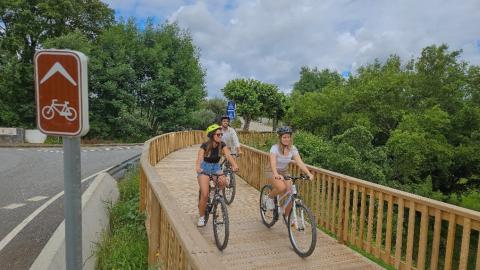
Mondego Eco-path: Intermodal Travel Made Easy in Coimbra Region

About this good practice
The CIM-Coimbra Region has been focusing on addressing the challenges of each Municipality of the region, which ends up with the need for more sustainable options to meet the mobility needs of the population. Under a low-carbon strategy envisioned for the Region, the initiative of the Mondego Eco-path was thoughtfully designed and implemented to create an infrastructure that would facilitate the promotion of intermodality in the Region. The path infrastructure was designed to involve several intermodal points with public transport service stations. This infrastructure contributes to the articulation and interconnection with public transport, namely rail transport (connection to Santa Comba Dão station) and highway transport, creating connections between municipalities in an inter-municipal logic. It creates continuity in terms of sustainable and smooth mobility between the urban centers of the municipalities, thus constituting an important axis of a network of cycle paths, promoting the provision of smooth modes in daily commutes - home-work-home, combining it with other transport modes.
The Mondego Eco-path initiative expands the existing cycling network and contributes to a strategic objective of the region.
The stakeholders are the municipalities and beneficiaries are the population, but also the tourists that may benefit from the eco-path strategic stations with connection to public transport.
Resources needed
The initiative is managed by CIM-Coimbra Region, through the sharing of competencies between municipalities, combining different local realities.
Total investment:1.710.000,00 €
Financing: Regional Operational Program CENTRO 2020, FEDER and PORTUGAL 2020 and Valorizar Turismo of Portugal Program
Evidence of success
The initiative shows that joint work between different entities and territories, to meet a common goal of achieving intermodality routes to improve the travel experience of those who are using bicycles for daily commuting along with public transport, is possible. It allows the movement of people and an inter-municipal axis for sustainable mobility, expanding the existing cycling offer and contributing to a strategic objective of the region that is promoting more sustainable mobility.
Potential for learning or transfer
The Mondego Eco-Path initiative is relevant for regions seeking to enhance sustainable mobility and intermodality.
By creating convenient connections between cycling routes and public transport, such as the train station, this intermodal approach can be replicated in areas with limited transport options, improving overall mobility. By coordinating efforts among municipalities, the CIM-Coimbra Region demonstrates a successful collaborative governance model. This joint management approach ensures that the diverse realities of each municipality are considered in achieving a unified strategic alignment with low-carbon goals.
It is also important to encourage residents to adopt cycling and intermodal commuting and show the potential intermodality option with flexible and regular public transport. Mondego Eco-Path initiative shows that with strategic planning, collaborative governance, and focus on sustainability, regions can successfully enhance mobility options and promote intermodality.





